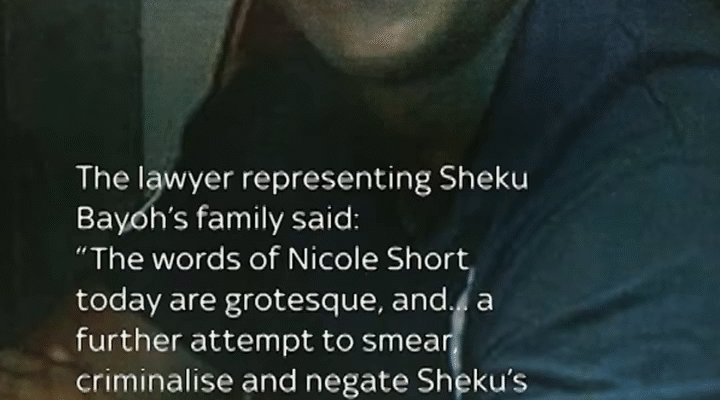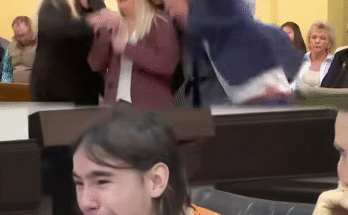💔 Sheku Bayoh’s Death in Custody: The Police Officer’s Side of the Story and the Battle Against Allegations of Racism
The tragic death of Sheku Bayoh in police custody in Fife, Scotland, in May 2015, remains a deeply divisive and painful episode in the ongoing conversation about policing, race, and accountability in the United Kingdom. His passing, after being restrained by multiple officers, sparked a long-running public inquiry and has inflicted lasting trauma on his family, as well as the police officers involved.
In a rare and emotional public account, former Police Scotland Officer Nicole Short, one of the officers who attended the scene, offered her perspective on the chaotic and terrifying events of that day, as well as the devastating personal and professional aftermath, which includes confronting persistent allegations of racism.
The Events of May 3, 2015: A Callout to a Man with a Weapon
The morning of May 3, 2015, began like any other for the officers on duty. The call that brought Nicole Short and her colleagues to Kirkcaldy was urgent and serious: reports of a man wielding a knife on the street. The situation was immediately classified as high-risk, demanding a rapid response to protect the public.
In her interview, Short vividly recounts the high-stakes encounter with Sheku Bayoh. Her narrative paints a picture of immediate and profound danger, a scenario police officers train for but hope to never face. She described Bayoh’s mannerisms as aggressive and intimidating, noting he moved “like a boxer” and hurled challenges at her. “I thought he was going to kll me,” she admitted, recounting the moment she was physically struck and overwhelmed. “I felt myself fall and that’s when I thought, I’m done here.”
This visceral recollection underscores the element of personal survival that, in the moment, dictated the officers’ response. The perceived threat—a man who they believed was armed and violently aggressive—shaped every decision made under immense pressure.
The Controversy of the Knife and the Inquiries
Central to the public inquiry and the subsequent legal and moral debate is the matter of the weapon. Police officers were dispatched under the premise of confronting a man with a knife. The inquiry later established a crucial and disputed fact: Sheku Bayoh was not found to be carrying a knife at the precise moment the officers arrived and restrained him, though a weapon was found nearby.
Nicole Short’s emotional testimony reflects the psychological chasm between the facts established after the event and the immediate, life-or-death perception of the officers on the street. She reiterated her belief that he was armed and capable of “stabbing somebody, murd’ring somebody.”
“Did you believe he had a knife on him?” she was asked. “Yes,” she confirmed. “What did you believe he would be capable of doing with that knife? Stabbing somebody, murd’ring somebody. Including you? Yes.”
This stark difference between the officers’ subjective fear of an immediate, lethal threat and the later, objective finding that no knife was on his person is a core point of contention. It speaks to the split-second decision-making of front-line policing and whether reasonable force, applied under a mistaken belief of imminent threat, can ever be justified, especially when the outcome is fatal.
The Heavy Burden of Racism Allegations
The most devastating and long-lasting consequence for the officers involved has been the accusation of racism. Sheku Bayoh was a black man; the officers who attended the scene were white. In the wake of his death, particularly given the global scrutiny on police interactions with minority communities, the Bayoh family and their supporters raised the question of whether racial bias played a role in the force used.
Nicole Short directly and tearfully addressed this accusation in her interview, stating it was “horrible” and a massive burden added onto the existing trauma.
“Do you believe that you have been painted out to be a racist?” the interviewer asks. “Yeah. Yeah,” she replies.
She vehemently denied the allegation, stating, “I’m not racist, no way.” She further contested the idea that race factored into her actions, stating clearly that she was responding to a “man with a knife, a dangerous weapon,” and that her response would not have changed had the man been white.
“Would you have acted differently in that moment if it was a white man?” “No,” she affirmed.
For the officers, the denial is absolute. They were responding to a perceived threat, a call for a man with a knife, and race, they maintain, was simply the unfortunate reality of the two individuals involved. For the family of Sheku Bayoh, however, the sequence of events and the nature of the restraint demand an inquiry into all possible underlying biases. The intersection of race and policing inevitably frames the inquiry, regardless of the individual officers’ stated intentions.
The Emotional and Mental Toll
The interview also shines a light on the severe personal cost to the police officer. Short revealed that the incident and its protracted aftermath—the internal investigations, the inquiry, and the public scrutiny—have left her with a “lifelong mental health condition.” The stress, fear, and subsequent public vilification have taken a profound toll on her and her family.
“His actions on that day… well, that’s left me with a lifelong mental health condition.”
This mental health crisis points to a broader systemic issue: the support mechanisms for police officers involved in critical, high-trauma incidents. While the focus must be on accountability and justice for the deceased, the long-term impact on the officers—even those cleared of wrongdoing—is often devastating.
The Family’s Fight for Justice and the Lawyer’s Response
The pain of Sheku Bayoh’s family is paramount in this tragedy, and their fight for answers and accountability is unwavering. The video appropriately includes the sharp and deeply critical perspective of the family’s lawyer in response to Nicole Short’s public statements.
The lawyer’s quote cuts directly against Short’s narrative of fear and self-defense: “The words of Nicole Short today are grotesque, and a further attempt to smear, criminalise and negate Sheku’s right to life.”
This statement encapsulates the family’s view that the officer’s narrative seeks to retroactively justify the fatal use of force and to malign Sheku Bayoh’s character, distracting from the core issue of why he died in police custody. For the Bayoh family, the narrative must focus on the state’s responsibility and the officers’ accountability.
Conclusion: A Divided Path to Truth
The Sheku Bayoh public inquiry is a complex, high-stakes search for the truth. It is a process that must balance the accountability of the state and the preservation of a citizen’s right to life against the reality of split-second policing decisions made under terrifying circumstances.
Nicole Short’s testimony provides a deeply personal and emotional lens into the officers’ perspective—a view defined by fear, threat perception, and the subsequent anguish of being labelled a racist murd’rer. Yet, this narrative stands in stark opposition to the Bayoh family’s fundamental demand for justice and their unshakeable belief that race was inextricably linked to the tragic outcome.
The ultimate findings of the inquiry will attempt to bridge this gulf, but the profound human tragedy—a life lost, a family devastated, and officers enduring long-term trauma—will remain a lasting mark on the record of Scottish policing.
Would you like me to search for the most recent updates on the Sheku Bayoh Public Inquiry?

